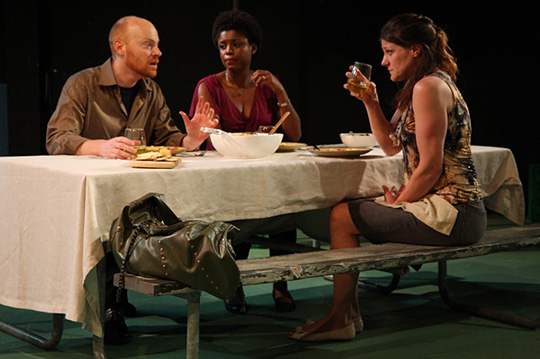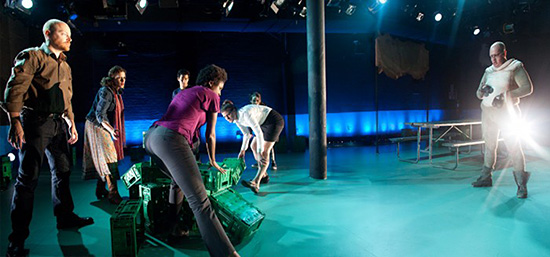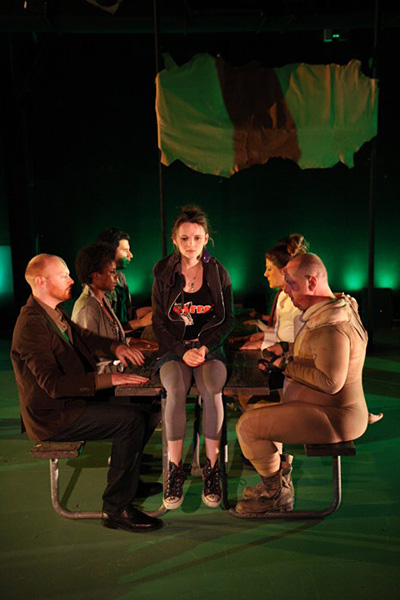 print preview
print previewback JASON GROTE | Civilization (All You Can Eat)
Director’s Commentary
by Seth Bockley
 |
|
| Jeff Biehl, Melle Powers & Elizabeth Rich Clubbed Thumb Photo by Carl Skutsch |
|
I’ve loved Jason Grote’s writing since I first read 1001, his take on the Arabian Nights, and had the chance to direct it in Chicago. Working inside of his plays is a chance to study with a master of the high-flying plot, the elegant dramatic construction, the embodied metaphor, and a mode you could call the epic-erotic-tragic-comedic. Grote is above all a disciplined master of suspense and restraint who knows when to twist the knife and how to hold the audience’s gaze just long enough on the ugly beautiful truth.
In 2011, when I was invited to direct his latest play, Civilization (All You Can Eat), I read it in one enthusiastic gulp and left the experience stunned and pleasantly sated by the work’s ambition, its wide wild vantage and allegorical gut-punch force.
Producing the premiere was the inimitable and essential downtown New York force, Maria Striar. Her company Clubbed Thumb’s Summerworks series was the perfect home for this language-dense, formally fragmented, funny, scary, and highly vernacular American play.
 |
|
| Jeff Biehl, Melissa Miller, Andres Munar, Melle Powers, Elizabeth Rich, Reyna de Courcy & Tony Torn Clubbed Thumb Photo by Heather Phelps-Lipton |
|
As we cast, rehearsed, assembled the design team, and worked towards our premiere at HERE Arts Center in Manhattan, a play that looked at first like satire became more clearly a humanistic and sneakily political work. Set in the summer before Obama’s election, each character possesses a type of innocence—a vulnerability evident in Zoe’s idealism, Carol’s frantic love, Jade’s gullibility, Mike’s efforts at self-rebranding, Karen’s magical thinking, and David’s embarrassment. These are not cynics. These are hurt and lonely Americans hungry to be loved and to belong. Above and behind all of them is Big Hog, a daemon of the sort Grote loves to conjure. Big Hog is the carnivorous soul of the play, a poetic spirit defying simplistic allegorical reading. Is he the symbol of American greed, ambition, and appetite? Is he the victim of human cruelty, broken free and out for revenge, or is he our mascot? Is he our all-devouring future or our blinkered past?
Stitching the scenes together in rehearsal revealed the challenges the play poses. It demands a lot from its audience—asking us to connect seemingly disparate scenes in a manner reminiscent of the epic ensemble films of the late-’90s and early 2000s like Magnolia, Amores Perros, or Boogie Nights, placing various strands and coincidental encounters inside an initially elusive larger universe. What unites the play for me, apart from the clever collisions and relationships the play unfurls, is the deeply American driftless yearning buried inside each scene.
Grote writes for actors, and with love for actors and their craft. Our ensemble loved showing up to rehearsal each day to discover the deeper flavors of awkwardness, irony, and sincerity, the tiny turns that suggested a different interpretation and colored the audience’s sympathy slightly differently. I came to think of each scene as a kind of short film, the whole thing like Coffee and Cigarettes with a carnivorous heart and the soul of María Irene Fornés.
 |
|
| Jeff Biehl, Melle Powers, Andres Munar, Renya de Courcy, Tony Torn, Elizabeth Rich & Melissa Miller Clubbed Thumb Photo by Carl Skutsch |
|
My concept for production was for the stage to be an American pastoral in miniature. This was inspired by Big Hog’s drive toward freedom beneath the stars in rural spaces which are (seemingly) boundless. Working to achieve this world I had the chance to work with great designers—Laura Jellinek, Shane Rettig, Jessica Pabst, Raquel Davis, and choreographer Dan Safer. Safer in particular, with support from the whole team, helped us make something elegant and impactful out of the three movement pieces indicated in the script. We tackled the dances with a healthy blend of playfulness and care. My advice from that experience: the dances are not transitions or suspensions in narrative but scenes in themselves—a chance for the ensemble to own the play in moments free from naturalistic premises, to name the stage as a landscape.
This is a wide-open text that lends itself to many interpretations but also deserves to be played simply on its own—played, as they say, at maximum volume. It’s punk. I love Grote’s stage direction about video/audio effects: “it can and should be done cheaply.” In many ways this thing is simpler than it looks.
Through the carnage and hilarity, Grote’s words keep us grounded. It’s with the play, as with America—there is nothing really fancy about this buffet. It’s as ugly as factory farming and as charming as a family diner beckoning you off the highway. Civilization (All You Can Eat) is a factory farm, a sketch-comedy set, a charnel house, a Gertrude Stein poem, a killing floor, a bad date, and a lovely night out beneath the stars. It’s civilization; it’s as simple as that. ![]()
Seth Bockley is a director and playwright. He has adapted several works of fiction to the stage, such as George Saunders’ story “Jon,” and Roberto Bolaño’s novel 2666, and written works such as Wilderness, the musical February House (with composer/songwriter Gabriel Kahane), and the puppet operettas Laika’s Coffin and The Death And Life of Billy The Kid. He has directed work such as Jason Grote’s Civilization (All You Can Eat) and Lauren Yee’s Sensura, among others. He is a graduate of Brown University, and is based in Saint Paul Minnesota.